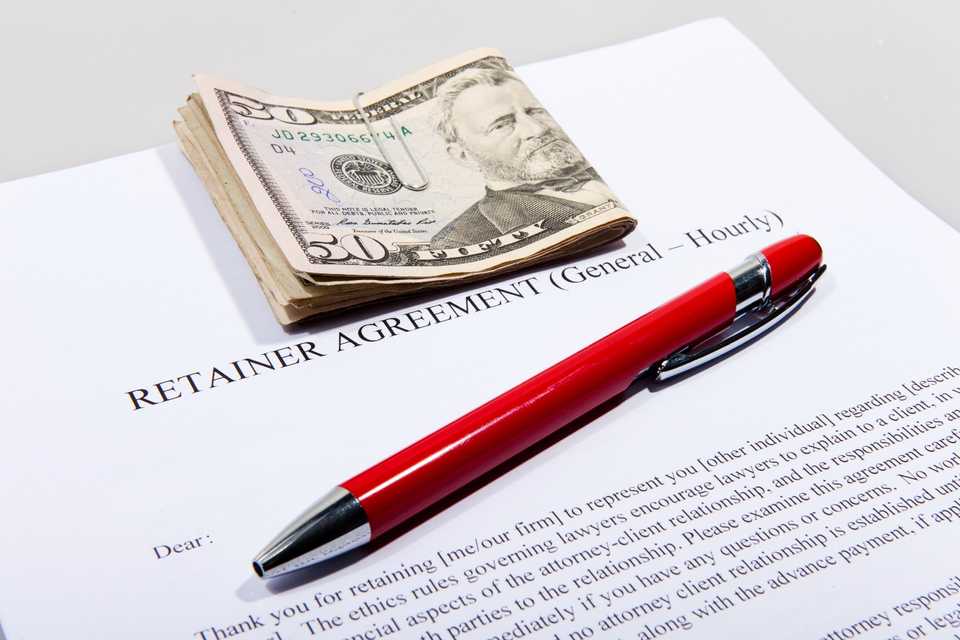Lawyers perform an essential role in many facets of people’s lives.
In fact, lawyers are present in almost all of our significant undertakings – marriage, divorce, business start-ups, investments, real estate purchases and sales, and many more.
Unfortunately, many are hesitant to hire a lawyer for fear of paying high legal fees and costs.
How much exactly does a lawyer cost in Ontario?

There is no straight answer to this question. It depends on the type of lawyer, the scope of the legal services needed, the complexity of the work, and the length of time it takes to do the work. Other facts like your location and whether the lawyer is from a small or large law firm can also have an impact on his fees.
In this article, we will provide you with the average rates charged by lawyers in Ontario to help you make plans.
You can also use our short online form to get actual quotes from lawyers in JuriGo so you can compare lawyers’ fees.
Types of Lawyers and their Fees
Lawyers, like most other professionals, also have specializations. Here are some of the specializations or areas of practice of lawyers in Ontario:
- Criminal lawyers;
- Labour and employment lawyers;
- Personal injury lawyers;
- Real estate lawyers;
- Wills and Estate lawyers;
- Business lawyers;
- Immigration lawyers;
- Civil lawyers;
- Family lawyers;
- Intellectual Property lawyers;
- Environmental lawyers;
- Tax Lawyers;
- Etc.
When looking to hire a lawyer for your legal situation, it is important to find the right type of lawyer to take on your case.
Lawyers are free to charge their own fees and these are usually based on their field of practice . For instance, criminal lawyers may charge higher fees due to the complexity of the case and the time it takes to prepare a defence. In contrast, a business lawyer for preparing a contract may charge much less.
Average Fees of Lawyers in Ontario
As we mentioned earlier, the average fees of lawyers in Ontario vary based on different factors including the type of case, scope of the work, complexity, and experience of the lawyer you choose.
Below is a guide on the average fees or rates of the different types of lawyers in Ontario.
| Type of Lawyer or Legal Service | Average Fees |
|---|---|
| Simple Divorce | $2,500++ |
| Basic Will | $350++ |
| Business Incorporation | $500++ and government fees |
| Shareholder Agreements | $200++ |
| Criminal Lawyers (Drunk Driving, Assault, Drug offences, Robbery/Theft, Fraud, etc. | * Average hourly rate of $300++ * Lawyers can also quote a flat flee *Get a quote tailored to the specifics of your case by using our online form |
| Real Estate Lawyers | Title Transfer: $700++ Refinancing: $700++ Purchase/Sale: $800++ Survivorship: $500++ |
| Immigration lawyer | $300++ for consultation or eligibility review |
| Civil Lawyers | $250 to $400 per hour *some lawyers also offer contingency rates (payment based on the percentage of your compensation) |
*These rates are for illustration only and are not actual rates from our network of lawyers.
Other approximate costs for Legal Fees in Ontario
One of the biggest issues in determining the cost of litigation is that it depends so much on how the other party reacts to the case.
Below are a few approximate costs for legal fees in Ontario to guide you.
-
Starting price of litigation $5000+ (Notice of Application, Supporting affidavit, serving the opponent with notices, etc.) This step is very important as it sets the direction and tone of the case, the success rate, and the timeframe.
-
A simple court appearance costs $1000++ (time for scheduling, preparing, appearing, and follow- up).
-
Daily cross-examinations, affidavits, etc., may cost around $2500
-
Mediation costs around $7,500-$8.000. Additional fees for mediator fees, court orders, minutes of the settlement, etc. will increase the cost.
-
Hourly rates of lawyers range from $300-$600 while law clerks charge lower rates from $150 to $250 per hour.
Litigation is an expensive undertaking due to the time and effort spent on the case . The more complex the case, the higher the cost.
Experienced lawyers can evaluate the details of the case to determine the likelihood of success, plan the best defense strategy or claim, and work hard to obtain the best possible outcome.
No matter what type of legal situation you are in, the best step is to consult the right lawyer from the JuriGo network.
Paralegal or Lawyer? How are they different?
Most people already know what lawyers do. They give legal advice, assist with business transactions to ensure they comply with legal standards, and represent people or businesses in legal disputes, charges, etc.
Many people, however, are not clear on what a paralegal does. The fact is that in some legal matters, hiring a paralegal can be a good option as they can help save on legal fees.

In Ontario, paralegals are recognized legal professionals who can represent clients in the following types of cases:
- Small Claims Court ( $25,000 and below)
- Traffic offenses (parking fines, speeding violations, etc.)
- Tribunals and Boards (Landlord and Tenant Board, WSIB)
- Summary Convictions (Trespassing, shoplifting, fines $5,000 or less, 6 months of imprisonment
- Licensing cases (Liquor License Act cases, vehicle insurance charges, Dog Owner’s Liability Act)
The qualifications and requirements of paralegals in Ontario are less stringent than lawyers, hence, their lower rates.
If your legal situation is complex and has high stakes attached, a lawyer may be your best option. For simpler legal matters requiring minor legal work, a paralegal can greatly reduce your legal fees.
Who pays for legal fees in Ontario?
In Ontario, the “loser pays” rule is followed. Initially, each individual involved in litigation pays their own fees.
At the end of litigation or trial, the court generally rules on “cost awards”. The losing party will pay the successful party a portion of the legal fees.

These awards can range anywhere from 30% to 70% of the winners’ actual costs . Hence, the winning party pays only a portion of his legal fees while the losing party pays all of his own fees plus a portion of the winner’s legal fees.
If a claim fails or is rejected, you may be ordered to pay the expenses of the opposing party . Once you start a claim, you cannot simply discontinue it without incurring some liability to the defendant in terms of his legal fees.
This emphasizes the importance of working with an experienced lawyer before initiating litigation or filing a claim to evaluate its potential for victory based on the circumstances of the case.
Legal Fees & Offers to Settle
Who pays for litigation costs dramatically changes with offers to settle . Rule 49 of the Rules of Civil Procedures states that the loser pays the winner a portion of the winner’s costs.
To motivate parties to settle, Rule 49 amends the rule and states that the party that obtains a better result at trial than what is offered at settlement is entitled to recover indemnity for costs from the other side and more indemnity costs moving forward.

For instance, a defendant, even if he loses at trial as a result of the settlement, can recover some costs from the plaintiff.
The cost of litigation can seem like it is out of your hands. But by remaining focused, working with a competent and experienced lawyer, and seeking mediation and settlement could greatly reduce your legal expenses.
Hiring a Lawyer and Understanding Legal Fees
It is important to understand the types of fees lawyers charge so you can best prepare your finances. When you look for a lawyer, request an estimate of what his services will cost . At times, he will quote an hourly fee for the task. You may also be charged for disbursements which cover expenses like faxes, photocopies, official documents needed for your case, etc.
Lawyers also charge disbursements to cover expenses for official documents needed in your file, photocopies of documents, faxes, etc.
Lawyers may also ask you to sign a retainer agreement which lists the costs and terms including the schedule of payments to your lawyer.
To find the best lawyer in Ontario to represent you, please fill out the short online form on this page and compare lawyer rates and fees.
How do lawyers and paralegals calculate their fees?

Lawyers and paralegals in Ontario generally use 3 methods to calculate their fees. They may charge you as follows:
- An hourly rate for the time working on your file;
- A flat fee for a specific service;
- On a contingency basis where you pay a percentage based on the success of your case.
Most lawyers and paralegals will also ask for a retainer (advance payment) and other disbursements (court fees, documents, etc.) You should ask the lawyer about a retainer and disbursements before he starts to work on your file.
Do you need a lawyer for a legal matter ? Find the right lawyer to help you by comparing rates from experienced lawyers in JuriGo with no obligation.
Frequently Asked Questions about Legal Fees in Ontario
Hiring a lawyer is a very big decision because your life, your career, and your freedom could be at stake!
Many people can’t make this decision easily because they don’t know if they can afford the legal fees.
We would like to answer some of the questions you may have to help you find the right lawyer to assist you.
What do legal fees in Ontario include?
Legal fees are paid to a lawyer for the time and effort spent on your file. The fee structure and schedule vary based on the type of case and your area. Legal fees may also include disbursements (expenses of your lawyer while working the case).
Do all lawyers accept legal aid certificates?
Not all lawyers accept legal aid certificates. You must check with the lawyer you wish to work with if you plan to pay with a legal aid certificate.
Why do some lawyers charge higher or lower fees?
Several factors have an impact on fees charged by lawyers – years of experience, level of skills, location, and the scope of services the lawyer is expected to do.
Are lawyers required to give all-inclusive quotes for legal fees in Ontario?
As of September 2017, Ontario’s rules regarding lawyers’ fees prevent them from advertising fees that are not all-inclusive. Lawyers in Ontario cannot advertise fees that don’t include other legal services and third-party charges or disbursements.
This means that when you ask for a lawyer’s quote, he must give you a clear idea of all fees you are expected to pay.
How much does a contingency lawyer charge?
Lawyers who work on a contingency basis collect a certain percentage of the money or value of a property involved in the case. The risk of not getting paid at all is high (no win, no pay). Thus, lawyers usually ask for 30% to 50% of the amount collected by the client.
More questions? Connect with the best lawyers in your area using our short online form, free of charge.
Find the best lawyer for your legal needs with JuriGo!

If you don’t have the means to pay for a lawyer, you have the following options:
- Apply for legal aid and use the legal aid certificate to pay for your lawyer. It will cover the fees of a private lawyer who accepts legal aid work based on the indicated number of hours.
- LAO can also provide a duty counsel lawyer to assist you in your court appearance.
- If you have income or own a property, you may still qualify for a legal aid certificate with a contribution agreement. You will need to pay back some of your legal fees based on your income on installment.
- Make an appointment with your local Community Legal Clinic .
Depending on your income, Legal Aid Ontario can pay for your legal expenses as long as your legal matter is under the scope of its services.
The best thing to do is to check if you qualify for legal aid. If you don’t, you can compare lawyer fees to get the best rates. Depending on your case, lawyers may be willing to work on a contingency basis.
Simply connect with the best lawyers in your area using our short online form today!
